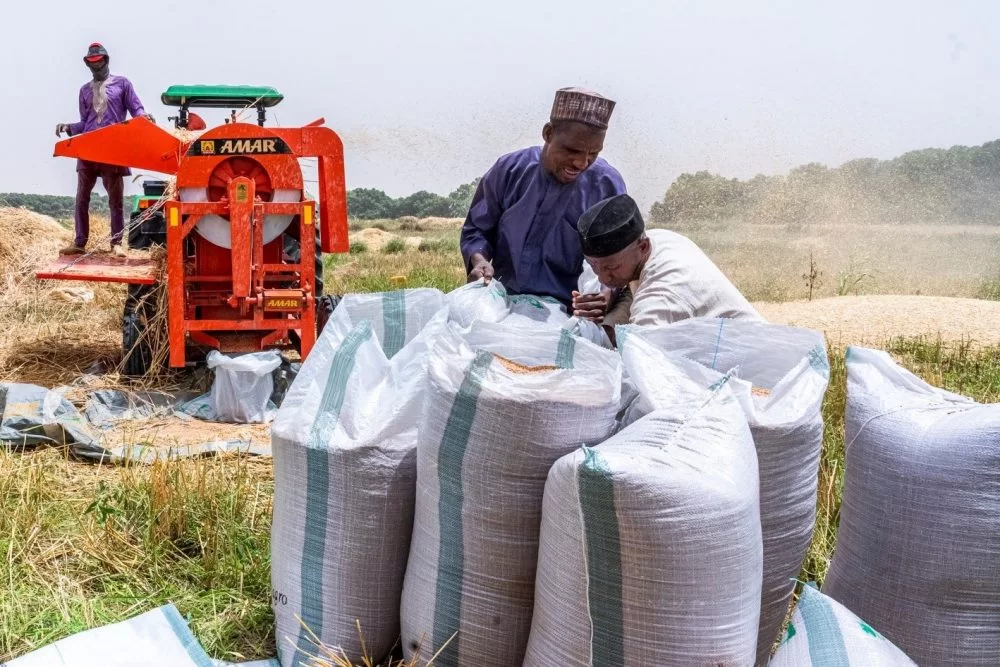Kano State has, in recent years, reasserted itself as northern Nigeria’s agricultural heartbeat: a region once famed for groundnuts, hides and skins, and bustling trade routes linking the Sahel to the coast. Today, its renewed focus on mechanised farming, agribusiness incubation and export diversification is rewriting that legacy.
With more than 70% of its over 4 million residents engaged in agriculture, Kano has channelled resources into improving irrigation systems, establishing agro-processing zones, and training youth in sustainable food production.
The Kano Agro-Industrial Zone, currently under development with international support, is projected to empower 750,000 women and boost the rural economy through the processing of rice, sesame, and tomatoes.
Kano’s agricultural renaissance
Beyond productivity, the state has made bold moves toward resilience. Investments in irrigation around Watari, Tomas, and Tiga dams can boost dry-season farming by 40%, while modern poultry and fish farming schemes are helping reduce dependence on imports.
Youth empowerment programmes, such as the Kano Agricultural Empowerment Scheme and Farm-to-Market Support Initiative, have trained thousands of young people in agritech, greenhouse cultivation, and post-harvest value addition.
These initiatives are quietly positioning Kano as a subnational model for agricultural transformation, even as food insecurity grips much of the country.
Guinea-Bissau’s agro aspirations
Across the Atlantic coast of West Africa, Guinea-Bissau is charting its own agricultural renaissance. With over 2.5 million hectares of arable land, yet only a fraction under cultivation, the country remains heavily dependent on raw cashew exports, which account for nearly 90% of its foreign exchange earnings.
Limited access to mechanisation, weak market linkages, and youth unemployment continue to constrain growth. The country’s leaders have therefore turned to regional cooperation as a strategy to diversify its economy, build human capital and modernise its agriculture.
It is against this backdrop that Kano State and Guinea-Bissau have entered into a bilateral partnership to promote collaboration in agriculture, education, tourism, and human development.
The initiative includes joint ventures in fish farming, cashew and mango value chains, skills acquisition in GSM repairs, and youth-focused agripreneurship.
Kano state will also be offering 50 scholarships for students from Guinea-Bissau to study English and Hausa in its institutions. This will deepen linguistic and cultural ties and also signal a new dimension of South-South subnational diplomacy in Africa.
This partnership holds profound implications for both economies. For Kano, it strengthens access to West Africa’s trade corridors, connecting its agro-products to Atlantic export routes through Bissau’s ports. It also gives the state a foothold in the ECOWAS subregional market, where agricultural exports are expected to rise as ECOWAS works toward increased agricultural trade and production.
For Guinea-Bissau, the alliance offers exposure to Kano’s extensive experience in value-chain development, irrigation management, and youth skills programmes, all of which could help the country shift from raw commodity export to agro-processing and trade diversification.
The collaboration also speaks to a larger vision: the growing role of Nigerian subnational governments as independent actors in Africa’s development diplomacy.
Kano’s engagement with Guinea-Bissau mirrors earlier successful partnerships, such as its livestock trade and border-market cooperation with Niger Republic, which increased bilateral commerce.
This partnership could yield shared gains across multiple dimensions, from food security and export growth to youth employment and cultural diplomacy.
Agricultural collaboration on crops like cashew, mango and fish could stimulate rural economies in both regions, while the academic exchange programme would promote language learning, intercultural competence and trade facilitation.
For Kano, the ability to attract international collaboration enhances its global visibility; for Guinea-Bissau, it represents access to technical knowledge and market systems within one of West Africa’s largest economies.
Summary not available at this time.






